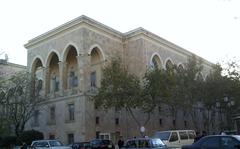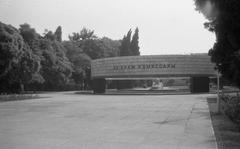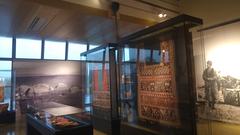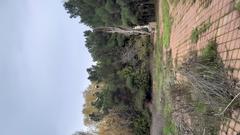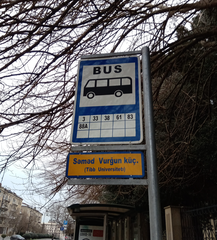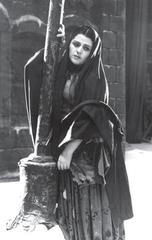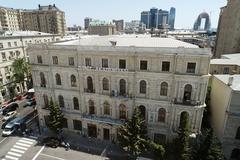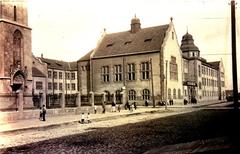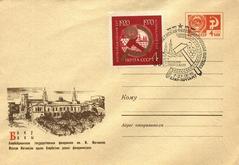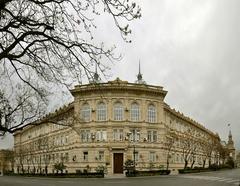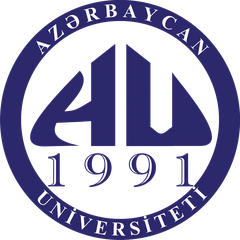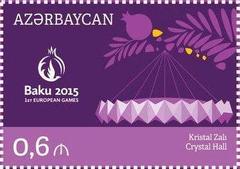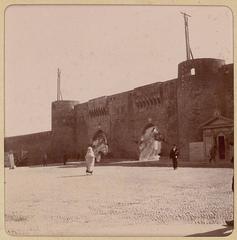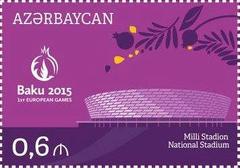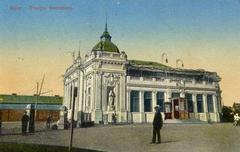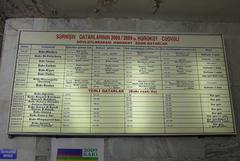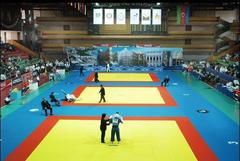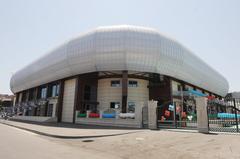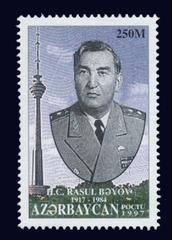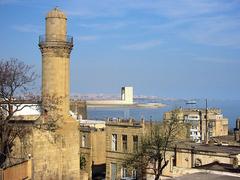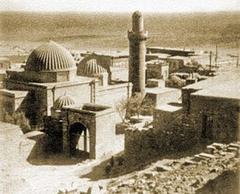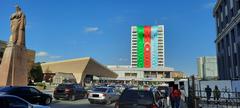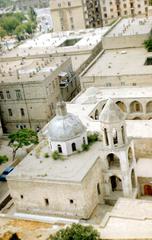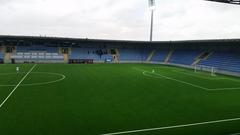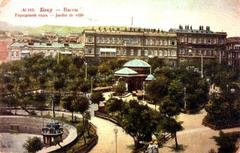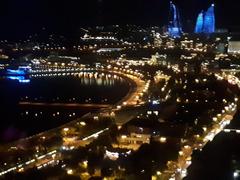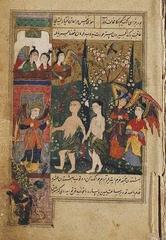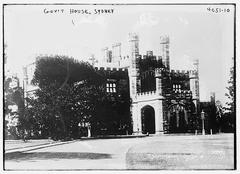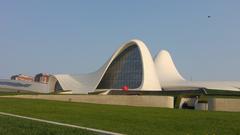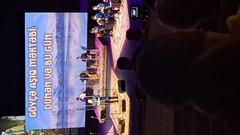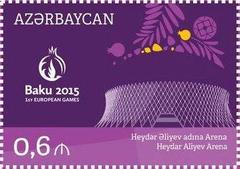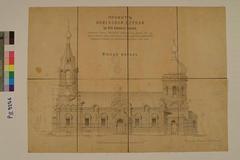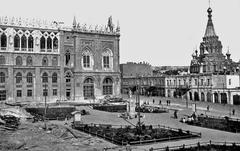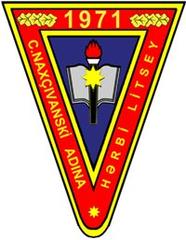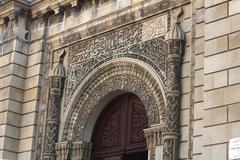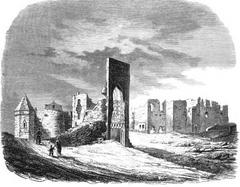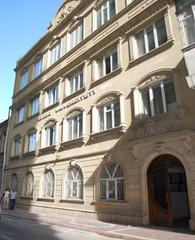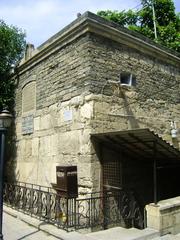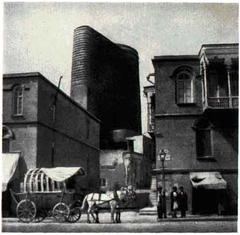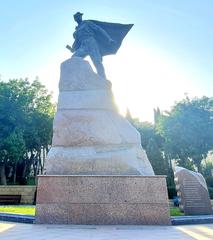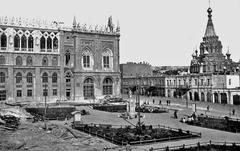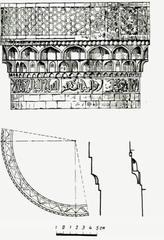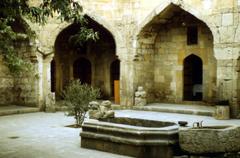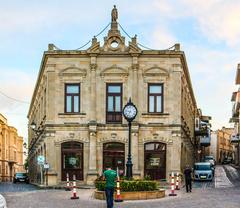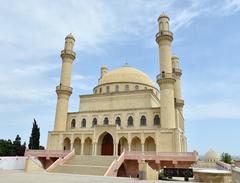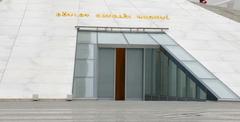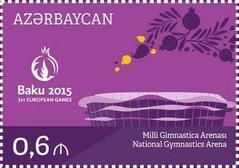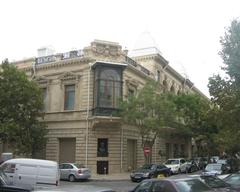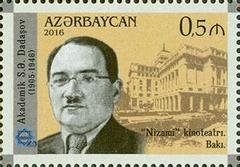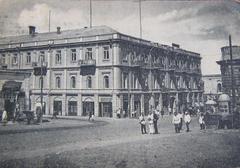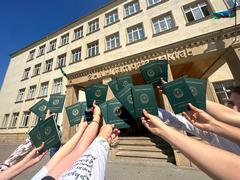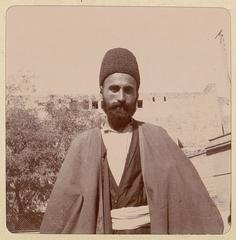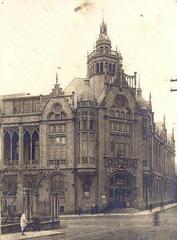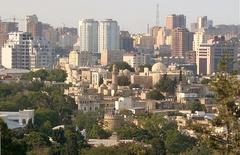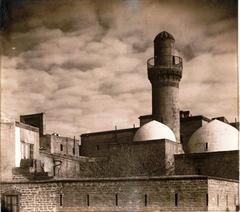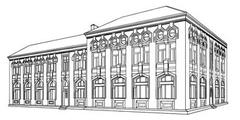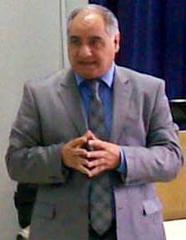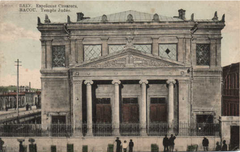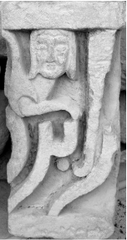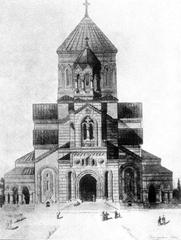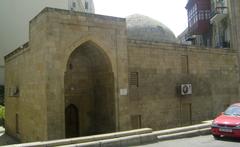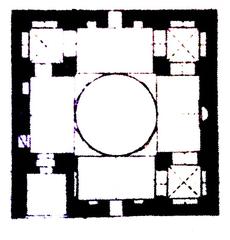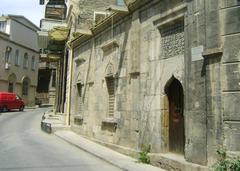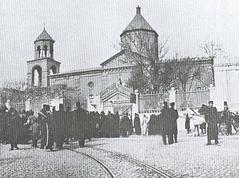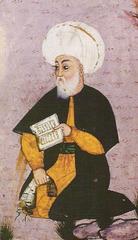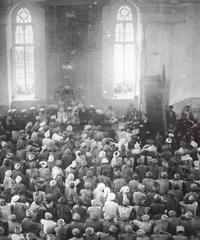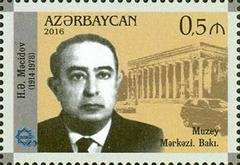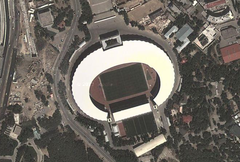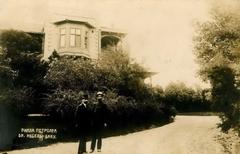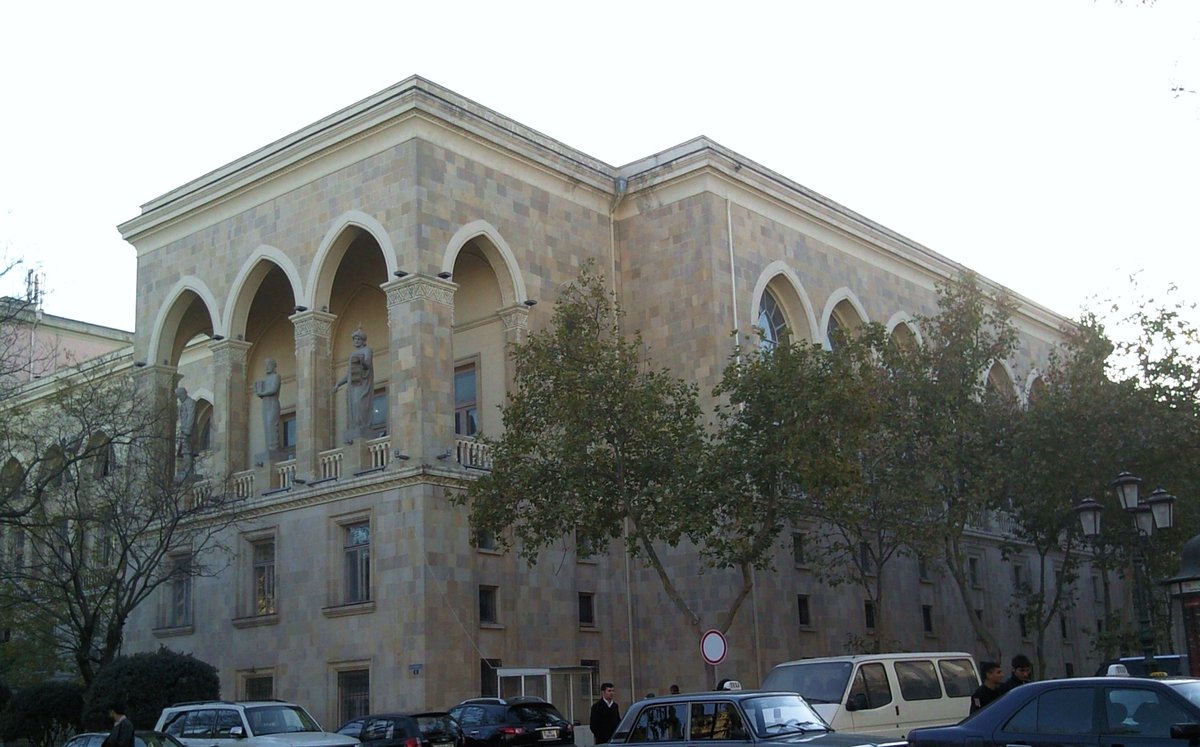
National Library of Azerbaijan, Baku: Visiting Hours, Tickets, and Historical Significance
Date: 14/06/2025
Introduction
The National Library of Azerbaijan, located in the vibrant center of Baku, is a cornerstone of the nation’s literary, cultural, and historical heritage. Established in 1923 and named after renowned playwright and philosopher Mirza Fatali Akhundov, the library has evolved into Azerbaijan’s premier repository, preserving more than 4.5 million items—including rare manuscripts, periodicals, maps, and audio recordings. Not only does it serve as a guardian of intellectual treasures, but it also stands out architecturally, blending Azerbaijani national motifs with modernist influences, courtesy of architect Mikayil Huseynov. The library’s multifaceted services, including guided tours, exhibitions, and digital resources, make it a must-visit for scholars, travelers, and culture enthusiasts alike (National Library of Azerbaijan, CENL).
This comprehensive guide delves into the library’s historical and architectural significance, outlines its collections and services, and provides practical information for visitors—covering visiting hours, ticketing, accessibility, and integration with Baku’s rich cultural scene.
Table of Contents
- Historical Development
- Architectural Significance
- Collections and Services
- Visitor Information: Hours, Tickets, and Facilities
- International Collaboration and Azerbaijani Society
- Nearby Attractions and Cultural Integration
- FAQ
- Summary and Visitor Tips
- References
Historical Development
Foundation and Early Years
The National Library was established in 1922 and opened to the public in 1923, initially operating within the Azerbaijan Academy of Sciences. Early support came from the Imperial Technical Society and the Baku Public Society, with an initial collection of 5,000 volumes. Under its first director, M. Salimov, the library quickly expanded its departments and services.
Soviet Era and Expansion
In 1939, the library was officially named after Mirza Fatali Akhundov and designated the nation’s central repository, responsible for archiving all Azerbaijani publications, including newspapers from before the Bolshevik Revolution. This period saw rapid growth in collections and the library’s status as a critical center for literary and historical research.
Post-Independence Modernization
Following Azerbaijan’s independence, the library relocated in 1960 to its current iconic building. Recognized officially as the “National Library” in 2004, it embraced modernization with automated catalogues, internet resources, and expanded international partnerships.
Cultural Milestones
Celebrating its centenary in 2023, the library continues to be a hub of cultural life, marked by visits from national leaders and the development of public programs that reinforce its societal importance.
Architectural Significance
Design and Location
The library’s striking building, designed by Mikayil Huseynov, stands at Rashid Behbudov Avenue and Nizami Street, anchoring a prominent district of Baku. Its design blends neoclassical forms with Azerbaijani decorative elements, making it both a functional institution and an architectural landmark.
Key Features
- Façade: Adorned with statues of literary luminaries, including Nizami Ganjavi and Alexander Pushkin.
- Interior: Features spacious reading rooms, a multi-level book repository, and a layout that accommodates up to 500 users.
- Recent Upgrades: Virtual book ordering systems, a new International Cooperation Hall, and ongoing enhancements for accessibility and digital engagement.
The library harmoniously integrates with Baku’s urban landscape and offers a compelling visual experience for visitors and photographers alike.
Collections and Services
Holdings and Special Collections
The National Library’s holdings exceed 4.5 million items, encompassing:
- Books and periodicals in Azerbaijani, Russian, Turkish, Persian, Arabic, and Western European languages.
- Rare manuscripts, early printed works, and illuminated texts.
- Maps, atlases, and archival documents covering Azerbaijani and regional history.
- Music scores, audio recordings, and personal archives of notable cultural figures.
Digital Transformation
In alignment with Azerbaijan’s e-government strategy, the library’s digital offerings include:
- Digital Library Portal: Thousands of digitized books, manuscripts, and periodicals.
- Online Catalogues: Remote search and reservation of materials.
- Virtual Exhibitions: Thematic displays on literature, national holidays, and anniversaries.
Visitor Services
- Multilingual reference desks (Azerbaijani, Russian, English).
- Specialized reading rooms for rare books, periodicals, and children’s literature.
- Interlibrary loans and research support.
- Free Wi-Fi and comfortable study spaces.
Accessibility
The building is equipped with ramps, elevators, and accessible restrooms, ensuring an inclusive environment for all visitors.
Visitor Information: Hours, Tickets, and Facilities
Location and Access
Centrally located on Khagani Street, the library is easily accessible by public transport and is within walking distance of Baku’s major cultural sites, such as the Maiden Tower and Fountain Square (Azerbaijan Travel).
Visiting Hours
- Monday to Friday: 9:00 AM – 7:00 PM
- Saturday: 10:00 AM – 5:00 PM
- Sunday: Closed
- Note: Hours may vary during holidays and special events; always consult the official website before visiting.
Tickets and Admission
- General Admission: Free for all visitors.
- Library Card: Required for access to reading rooms and borrowing privileges; register on-site with valid ID or passport.
- Guided Tours: Available in Azerbaijani, Russian, and English; book in advance online or at the information desk. Some special exhibitions or events may carry a nominal fee.
Facilities and Visitor Support
- Reading and study rooms
- Exhibition halls
- Digital access terminals
- Multilingual signage and helpful staff
- Café and rest areas
Photography Policy
Photography is permitted in public areas for personal use. Restrictions may apply in special collections or during certain exhibitions—always confirm with staff.
International Collaboration and Azerbaijani Society
National and Educational Role
As Azerbaijan’s largest state repository, the library serves over 257,000 registered readers and 7.2 million virtual users annually (CENL). It acts as a scientific and methodological center, supporting other libraries through training and professional development (Wikipedia).
Preservation and Digitization
Ongoing projects focus on digitizing rare and fragile documents, ensuring the longevity and accessibility of Azerbaijan’s cultural heritage.
International Partnerships
The library actively collaborates with global institutions, signing memoranda with 57 countries and participating in organizations such as IFLA and CENL. It engages in book exchanges, joint exhibitions, and digitization initiatives, highlighting Azerbaijani culture on the international stage (Qatar National Library).
Nearby Attractions and Cultural Integration
Key Sites
- Maiden Tower: Iconic medieval structure in the Old City (Icherisheher).
- Fountain Square: Lively hub for dining and entertainment (The Diary of a Nomad).
- Nizami Museum of Literature: Celebrates Azerbaijani literary heritage (The Tourist Checklist).
- Azerbaijan Carpet Museum: Showcases traditional crafts along the Caspian seafront.
Cultural Events and Itineraries
The library frequently partners with local institutions for joint exhibitions, lectures, and festivals. Suggested itineraries include a literary walk from the library to nearby museums and pedestrian avenues, providing a holistic cultural experience.
Visitor Support
Tourist Info Points on Nizami Street and Baku Boulevard offer maps, brochures, and personalized guidance (Azerbaijan Travel).
FAQ
Q: What are the National Library of Azerbaijan’s visiting hours?
A: Monday to Friday, 9:00 AM–7:00 PM; Saturday, 10:00 AM–5:00 PM; closed Sundays and public holidays.
Q: Is there an entrance fee?
A: General admission is free; some special exhibitions or guided tours may require a ticket.
Q: Are guided tours available?
A: Yes, in multiple languages. Advance booking is recommended.
Q: Is the library accessible for visitors with disabilities?
A: Yes, with ramps, elevators, and accessible restrooms.
Q: Can I take photos inside the library?
A: Yes, in public areas. Restrictions may apply in special collections—please confirm with staff.
Summary and Visitor Tips
The National Library of Azerbaijan is a vibrant hub of knowledge, culture, and architecture at the heart of Baku. Its extensive collections, commitment to digital innovation, and inclusive visitor services make it a rewarding destination for anyone interested in Azerbaijani heritage. Located centrally and surrounded by historical landmarks, the library is easily integrated into a broader cultural itinerary.
- Plan ahead: Check opening hours and event schedules on the official website.
- Register for a library card if you wish to access reading rooms or borrow materials.
- Combine your visit with nearby cultural attractions for a comprehensive experience.
- Download the Audiala app for guided tours, interactive maps, and insider tips.
Stay informed and engaged with Azerbaijan’s literary and cultural scene by following the library’s social media channels.
References and Further Reading
- National Library of Azerbaijan, Official Website
- Conference of European National Librarians (CENL), National Library of Azerbaijan Profile
- Azerbaijan Travel: Tourist Info Points and Cultural Sites
- Wikipedia: Libraries in Azerbaijan
- The Diary of a Nomad: Best Places to Visit in Baku
- The Tourist Checklist: Things to Do in Baku, Azerbaijan
- Qatar National Library: Partnerships
